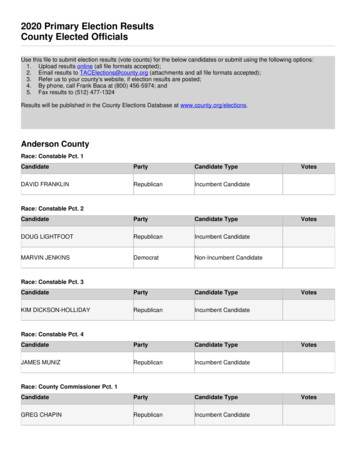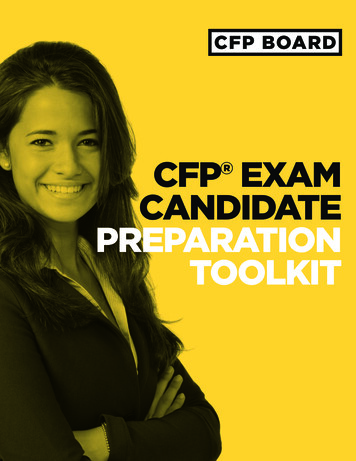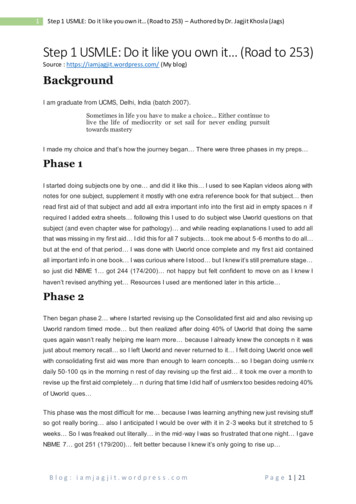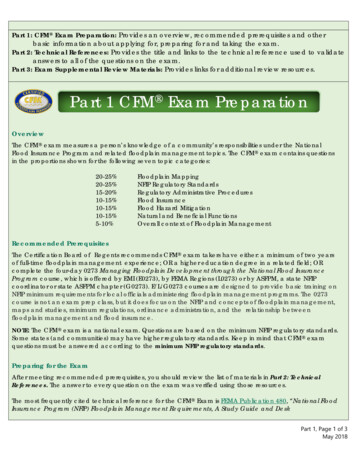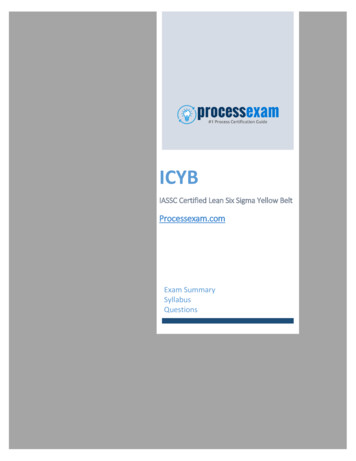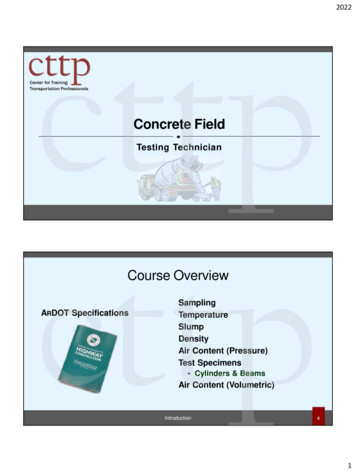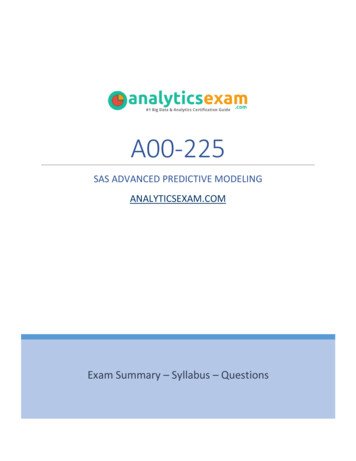
Transcription
CertificationCandidateHandbookGE T TING PEOPLE MOVING
Copyright 2022 American Council on Exercise Printed in the United States of America.All rights reserved. Except for use in a review, thereproduction or utilization of this work in any form orby any electronic, mechanical, or other means, nowknown or hereafter invented, including xerography,photocopying, and recording, and in any informationretrieval system, is forbidden without the writtenconsent of the American Council on Exercise.ACE, ACE IFT, ACE Integrated Fitness Training, andAmerican Council on Exercise are registered trademarksof the American Council on Exercise. Other productnames used herein are for identification purpose onlyand may be trademarks of their respective companies.Distributed by:American Council on Exercise4933 Paramount Dr.San Diego, CA 92123(888) 825-3636ACEfitness.orgP22-04Revised March 2022Requirementsand processesnecessary to earnand maintainACE Certifications
iiiCERTIFICATION CANDIDATE H ANDBOOKContentsIntroduction 23ACE Mission Statement3ACE Certification Programs4Accreditation5Statement of NondiscriminationCertification Exam Eligibility Criteria 614ACE Certified Professionals14ACE Certification Exams14Exam Content Outlines15Study Materials and ResourcesThe Certification Exam Process 1616 Exam Registration17Live Site Special Accommodations17International Exams7Eligibility Requirements17LRP Special Accommodations8ACE Code of Ethics17Exam Fees18Exam AdministrationACE Certification Exam Development 99ACE Credentialing Department10Testing Service Provider11Exam Development Procedures12ACE Certification Committees12Objectivity in Exam Development12SecurityAmerican Council on ExerciseEarning An ACE Certification 1318 Test-taking Strategies for ACE Certification Exams21Exam Scoring and Passing Criteria21Exam Results22Verification of Certification Status22Exam Delivery and Security22Live Site Administration and Security23LRP Administration and Security24Calculator Policy24Confidentiality Policy25Cheating and Other Testing Violations25Candidate Comments
ivCERTIFICATION CANDIDATE H ANDBOOKMaintaining YourACE Certification 2627 Recertification Policies and Procedures27Renewing an Expired Certification28Continuing Education Credits29Continuing Education Petitions29 Maintaining Your CPRand AED Certificates29ACE Educational Services30Career Development30ACE Certification MarksAppendices 34Appendix A:34Appeals for Denied EligibilityAppendix B:34 ACE Professional Practices andDisciplinary ProceduresAppendix C:35 Exam Scoring Appeals and RescoringAppendix D:36 Pass Rates for ACE Certification ExamsPrivacy, Security, andRecords Retention 3131Protection of Privacy33Length of Records Retention33SecurityAmerican Council on ExerciseAppendix E:36 Rescheduling, Retakes, and Refunds
2EXAM CANDIDATE H ANDBOOKIntroductionFOUNDED IN 1985, the American Council on Exercise (ACE) is a nonprofitorganization committed to America’s health and well-being. Over the past30 years, we have become an established resource for health and exerciseprofessionals and the public, providing comprehensive, unbiased research andvalidating ourselves as the country’s trusted authority on health and 00,000ACE CERTIFICATIONSAmerican Council on ExerciseToday, ACE is the largest nonprofit health and fitness certification, education, andtraining organization in the world, with more than 90,000 certified professionalswho hold approximately 100,000 ACE Certifications. With a long heritage incertification, education, training, and public outreach, we are among the mostrespected organizations in the industry and a resource the public has come totrust for health and fitness education.This ACE Certification Candidate Handbook covers the requirements andprocesses necessary to earn and maintain ACE Certifications.
3CERTIFICATION CANDIDATE H ANDBOOKACE Certification ProgramsThe American Council on Exercise has four core fitness certification programs, each with aunique population and/or programming focus. Each ACE Certification program is evaluated ona regular basis to ensure that it is up-to-date with the most current research and standards.Assessments for each certification program are also updated on a regular basis, and aredesigned to assess if candidates meet the established level of minimum competence to safelypractice within the scope of practice of the specified certification.ACE PERSONAL TRAINER CERTIFICATIONThe ACE Personal Trainer Certification is designed for health and exercise professionalsproviding one-on-one or small-group fitness instruction to individuals who are apparentlyhealthy or have medical clearance to exercise.ACE GROUP FITNESS INSTRUCTOR CERTIFICATIONThe ACE Group Fitness Instructor Certification is designed for health and exercise professionalsteaching any form of exercise to apparently healthy individuals in a group setting.ACE HEALTH COACH CERTIFICATIONThe ACE Health Coach Certification is designed for fitness, healthcare, corporate wellness,and allied health professionals coaching a wide variety of individuals and groups to adoptstructured behavior-change programs that focus on lifestyle and weight managementthrough physical activity, nutrition, and education necessary to improve and maintain health,fitness, weight, and total wellness.ACE MEDICAL EXERCISE SPECIALIST CERTIFICATIONThe ACE Medical Exercise Specialist Certification is designed for advanced health andexercise professionals providing in-depth preventive and post-rehabilitative fitnessprogramming for individuals who are at risk for, or are recovering from, a variety ofcardiovascular, pulmonary, metabolic, and musculoskeletal diseases and disorders, as wellas apparently healthy clients in special population groups, including older adults, youth, andprenatal and postpartum women.American Council on ExerciseOUR MISSIONTo get peoplemoving.
4CERTIFICATION CANDIDATE H ANDBOOKAccreditationNCCA ACCREDITATIONACE’s four core certifications have been continuously accredited by the NationalCommission for Certifying Agencies (NCCA) since 2003. The NCCA, created in 1987,is the accrediting body of the Institute for Credentialing Excellence (ICE), which wasformerly known as the National Organization for Competency Assurance (NOCA).The NCCA is an independent non-governmental agency that accredits certificationprograms in a variety of professions, including athletic training, dietetics, occupationaltherapy, financial services, and fitness, to help ensure the health, welfare, and safetyof the public. The NCCA reviews the certification organization’s procedures, protocols,and operations, and determines if the certification properly discriminates betweenthose who are qualified and those who are not qualified to be awarded the respectivecredential. The NCCA evaluates the processes and systems used by an organizationto identify professional role and scope of practice, develop exam content, and provideproper exam administration and scoring to ensure the following: That the examination process is fair and unbiased That the examination accurately measures the minimal competence of thecandidate for the profession Thatthe public is protected from unqualified or ineffective practitioners Thatthe organization has the means to support its professionalsThe NCCA has 24 Standards that a certification organization must meet and remain incompliance with in order to earn NCCA Accreditation. These NCCA Standards serve asa benchmark for how organizations should conduct certification programs.For more information about the National Commission for Certifying Agencies, please goto the NCCA website: ican Council on ExerciseWhat does the NCCA accreditation standard mean to youas a health and exercise professional?The International Health, Racquet and Sportsclub Association (IHRSA) and MedicalFitness Association (MFA) recommend that club owners and medical fitness facilityoperators hire exercise professionals with certifications that are accredited by theNCCA or an equivalent accrediting organization. In addition, the Standards andGuidelines for the Accreditation of Educational Programs for Personal Fitness Training,established by the Committee on Accreditation for the Exercise Sciences (CoAES) ofthe Commission on Accreditation of Allied Health Education Programs (CAAHEP),include students’ performance on a national credentialing examination accredited bythe NCCA as one of the primary outcomes for earning this accreditation. By earningan NCCA-accredited ACE Certification, health and exercise professionals demonstratethat they meet the qualifications to take a legitimate place in the healthcare continuumwithin their defined scope of practice. Earning and maintaining an NCCA-accreditedcertification can give you a competitive advantage when being considered as acandidate for employment with a company or organization that belongs to IHRSA orMFA, as it demonstrates that you have the knowledge, skills, and abilities to providethe public with safe and effective exercise programs.
5CERTIFICATION CANDIDATE H ANDBOOKStatement of NondiscriminationACE recognizes its responsibility to administer all of its policies in a manner consistent with federal, state and local laws andregulations. In particular, ACE recognizes that equal opportunity is fundamental to equality in all forms of human endeavor.Therefore, all administrative practices and procedures will be applied free of discrimination on the basis of race, creed,national origin or heritage, age, religion, sex, gender or gender expression or identity, sexual orientation, pregnancy, physicalor mental disability, medical condition, ancestry, marital status, or service in the uniformed services.American Council on Exercise
6EXAM CANDIDATE H ANDBOOKCertification Exam Eligibility CriteriaTO SIT FOR an ACE Certification Exam, you must meet all eligibilityrequirements that have been established for that particular certification exam,as detailed below. On the day of the exam, candidates must present a currentgovernment-issued ID with a photo and signature that matches the first andlast name on your ACE registration.American Council on Exercise
7CERTIFICATION CANDIDATE H ANDBOOKEligibility RequirementsACE PERSONAL TRAINER AND GROUPFITNESS INSTRUCTOR CERTIFICATION EXAMS You must be at least 18 years of age. You must hold a current adult cardiopulmonary resuscitation (CPR) and automatedexternal defibrillator (AED) certificate including live skills check.* You must have completed high school (or the equivalent).ACE HEALTH COACH CERTIFICATION EXAM You must be at least 18 years of age. You must hold a current adult CPR and AED certificate including live skills check.* You must submit supporting documentation for one of the following: Current NCCA-accredited certification† in fitness, nutrition, healthcare,wellness, human resources, or a related field; orACE MEDICAL EXERCISE SPECIALIST CERTIFICATION EXAM You must be at least 18 years of age. You must hold a current adult CPR and AED certificate including live skills check.* You must submit supporting documentation for each of the following: A four-year (bachelor’s) degree in exercise science or a related field‡ 500 hours of work experience designing and implementing exercise programsfor apparently healthy individuals and/or high-risk individuals, as documentedby a qualified professional**Medical Exercise Specialist eligibility documentation information can be found here:ACEFitness.org/myace/exam-preapproval-mes.You may also contact the ACE Credentialing Department via email atCredentialing@ACEfitness.org for additional information regarding the pre-approvalprocess for Advanced Certifications.For information regarding appeals for denied eligibility, refer to Appendix A. An associate’s degree or higher from an accredited college or university in fitness,exercise science, nutrition, healthcare, wellness, or a related field;‡ or Completed health coach training and education program approved by theNational Board for Health and Wellness Coaches (NBHWC)‡; or A minimum of 2 years of documented work experience in coaching, leading,designing, implementing, or facilitating one or more of the following: behavioror lifestyle change, exercise, wellness, nutrition, or physical activityHealth Coach eligibility documentation information can be found here:ACEFitness.org/myace/exam-preapproval-hc.* CPR and AED are both required in the U.S. and Canada. Candidates outside the U.S. and Canada are required to hold only current CPR due to differing laws regarding AED use by non-medicalprofessionals in some countries. Candidates taking an ACE exam via computer-based testing must hold a current CPR/AED certificate prior to registration.†A list of NCCA-accredited certification programs can be found via the following link.‡ A list of NBHWC-approved training and education programs can be found at: nbhwc.org/approved-programsNote: Candidates must submit supporting documentation of current NCCA-accredited certifications, degrees, and/or work experience used to meet eligibility requirements prior to registering for theACE Health Coach exam.** Candidates for the ACE Medical Exercise Specialist exam must also submit documentation of their 500 hours of work experience prior to, or at the time of, exam registration.American Council on Exercise
8CERTIFICATION CANDIDATE H ANDBOOKACE Code of EthicsThe ACE Code of Ethics governs the ethical and professional conduct of ACE Certified Professionals when working with clients,the public, or other health and exercise professionals. Every individual who registers for an ACE Certification Exam must agree touphold the ACE Code of Ethics throughout the exam process and as a professional, should they earn an ACE Certification. Examcandidates and ACE Certified Professionals must have a comprehensive understanding of the code and the consequences andpotential public harm that can come from violating each of its principles. The ACE Code of Ethics reads as follows:As an ACE Certified Professional, I am guided by the American Council on Exercise’s principles of professional conductwhether I am working with clients, the public, or other health and exercise professionals. I promise to: Provide safe and effective instruction Provide equal and fair treatment to all clients Stay up-to-date on the latest health and fitness research and understand its practical application Maintain current CPR and AED certificates and knowledge of first-aid services Comply with all applicable business, employment, and intellectual property laws Uphold and enhance public appreciation and trust for the health and fitness industry Maintain the confidentiality of all client information Refer clients to more qualified health or medical professionals when appropriate Establish and maintain clear professional boundariesThese principles of professional conduct make up the ACE Code of Ethics. During the exam registration process, candidatesmust affirm their agreement to uphold the ACE Code of Ethics throughout the ACE Certification process and in theirprofessional work should they earn an ACE Certification.American Council on Exercise
9EXAM CANDIDATE H ANDBOOKACE Certification Exam DevelopmentACE Credentialing DepartmentThe ACE Credentialing Department functions independently in its oversight of American Councilon Exercise certification activities. This includes governance over exam development andadministration, eligibility requirements to sit for and then earn an ACE Certification, issuanceof certifications, criteria for maintaining ACE Certifications through enhanced continuedcompetence, and developing and implementing disciplinary procedures.The ACE Credentialing Department upholds ACE’s established policies and procedures inmaintaining the integrity of all examinations set in accordance with NCCA accreditationstandards. ACE Certifications are awarded only to individuals who meet the eligibilityrequirements for the certification and then demonstrate that they meet or exceed theestablished level of professional competence by passing the certification examination.Governance for ACE Certification program direction is provided by the ACE Board of Directorsand the ACE Executive Team. Under the direction of ACE’s President and Chief Science Officer,and ACE’s Senior Director, Standards and Practice Advancement, the ACE CertificationProgram Manager oversees all administrative acts of the ACE Credentialing Department,including management of all ACE meetings and processes focused on ACE Certifications, examdevelopment, disciplinary committees, and management of ACE’s business relationships withScantron, the testing service provider that ACE contracts for the development, delivery, scoring,validation, and security of all ACE Certification examinations.American Council on Exercise
10CERTIFICATION CANDIDATE H ANDBOOKThe ACE Credentialing Department functions to achieve the followingprofessional objectives: To create and publish standards, policies, and procedures for the developmentand administration of ACE Certification programs To determine candidate eligibility criteria to sit for each ACE Certificationexamination and for recertification To establish policies, procedures, and requirements for continuing educationand recertification for all ACE Certified Professionals To confer recognition to individuals who successfully earn the ACE credentialTesting Service ProviderACE utilizes the services of Scantron to develop, administer, score, and report all ACECertification exams. Scantron offers comprehensive content services built on a history ofdeveloping quality high-stakes certification examinations for organizations that licenseor certify the expertise of professionals in various fields, including medical technology,engineering, athletic training, occupational therapy, and fitness. Their specific examdevelopment services include: Job/task analysis and role delineation studiesand who successfully complete the continuing education and recertification Development of test specificationsrequirements established by ACE Content validation studies To define the scope of practice for each ACE Certification Establishing cut score standards To develop standards for professional conduct, known as the ACE Code of Computerized item banking and examination productionEthics, and implement procedures for addressing violations according to ACE’sProfessional Practices and Disciplinary Procedures (see Appendix B) To uphold and promote the validity of the ACE credential to stakeholders To comply with standards of, implement policies and programs for, and submitrelevant certification and recertification information to regulatory bodies tosupport the validity and reliability of ACE credentials To earn and maintain accreditation (e.g., NCCA, ISO/IEC 17024) for ACE’scertification programs and secure recognition for ACE Certified Professionalsfrom Registers of Exercise Professionals (e.g., USREPS and ICREPs) in the U.S.and abroad. To acquire, develop, distribute, and maintain information relative to the certificationfunctions of ACEAmerican Council on Exercise Item writing (virtual and in-person) and test assembly Editorial and psychometric reviews Delivery of exams in computer-based testing and live remote proctored formats Proctor and exam site identification and trainingScantron is located at the following physical address:Scantron3005 Carrington Mill Blvd, Suite 150Morrisville, NC. 27560Phone: 919.572.6880Web: www.ScantronAssessment.comEmail: info@Scantron.com
11CERTIFICATION CANDIDATE H ANDBOOKScantron administers proctored certification and licensure examinations toScantron to uphold these rigorous standards for all ACE Certification programs. Thiscandidates almost anywhere in the world at live site testing facilities and in homesensures that certified professionals meet minimum standards of knowledge and skillsvia live remote proctored (LRP) exam administration offered in partnership withnecessary to provide safe and effective exercise instruction and health coaching for theExamity. Exam administration services provided include:protection of the public. Establishing secure domestic and international test sitesAll ACE Certification Exam questions and exam forms are developed by representative Establishing secure LRP test administration partnerships and procedurespanels of industry experts called subject matter experts (SMEs), who are recognized by Hiring and training proctorsACE for their expertise in one or more areas relating to at least one ACE Certification Adhering to Americans with Disabilities Act requirements forspecial-needs candidates Providing exam registration services Verifying candidate identification Developing test administrator and proctor manuals Scoring, equating, and scaling of examinations Secure reporting of exam results to candidates Secure storage of examination results and candidate informationScantron provides individual and aggregated score reports. Individual reports provide finalscaled score, pass/fail status, and domain performance (percentage correct). Aggregatedscore analysis evaluates item performance, to help certification programs in identifyingquestions that continue to effectively measure knowledge and skills and those that meritretirement or rewriting. Scoring and reporting services include: Scoring, scaling, and equating as appropriate for the certification program Post-examination item analysis and summary statistics review Generating customized score reports Hand-scoring upon request Preparing diagnostic reportsExam Development ProceduresScantron specializes in offering comprehensive content services, including high-stakescertification examination development, and upholds these rigorous standards for examdevelopment, administration, scoring, and equating. ACE works collaboratively withAmerican Council on Exerciseprogram. The composition of exam development committees varies for each certificationprogram due to the different focus and scope of practice for each certification. Thesecommittees are composed to fulfill the qualification requirements for each certificationweighted according to the exam content outlines.All ACE Certification Exams are developed using a six-point exam development processguided by standards accepted by the American Psychological Association, the AmericanEducational Research Association, and the National Council on Measurement inEducation. These steps are facilitated by the psychometric team at Scantron and include: JOB ANALYSIS/ROLE DELINEATION: A group of industry experts analyzes thespecific job requirements in order to develop an outline of the tasks, knowledge,and skills required to perform the job effectively (e.g., group fitness instruction,personal training). VALIDATION STUDY: A research survey is conducted to determine the validityof the job analysis. The survey is sent for validation to a large, random, nationalsample of health and exercise professionals who currently hold the certificationfor which the job analysis was conducted. ITEM WRITING: A national and representative panel of industry experts developsexam questions that are tied to exam specifications and referenced to acceptabletexts or documents. Once completed, each exam item, or question, must bevalidated by three SMEs who were not involved in writing the question. EXAM ASSEMBLY: The questions are reviewed, selected, and approved byan exam committee. The constructed exam is then forwarded to Scantronfor final editing. CUT SCORE DETERMINATION: The passing score is determined as a standard
12CERTIFICATION CANDIDATE H ANDBOOKusing criterion-referenced procedures. The experts estimate the percentage ofObjectivity in Exam Developmentminimally competent professionals that will answer each question correctly. TheACE recognizes that equal opportunity is fundamental to equality in all forms ofpassing score is then calculated and based on the overall degree of difficulty.human endeavor. Therefore, all administrative practices and procedures will befor public protection. Each question is rated by a group of industry experts CONTINUAL EXAM EVALUATION: Following an exam administration, there isa continual evaluation and analysis of each question to help ensure validity. If aquestion is determined to be flawed, it is reworked or replaced. Exam questionsand exam forms will also be retired once they have had significant exposure interms of exam candidates.A new exam development process begins every five years, beginning with a new jobanalysis/role delineation. ACE Certification Exams are developed using the six-pointexam development process and are guided by standards accepted by the AmericanPsychological Association, the American Educational Research Association, andnondiscriminatory on the basis of race, creed, national origin or heritage, age, religion,sex, gender or gender expression or identity, sexual orientation, pregnancy, physicalor mental disability, medical condition, ancestry, marital status, or service in theuniformed services. This includes all certification and exam development activities.ACE SMEs go through training at the beginning of each certification committeemeeting and before virtual item writing to ensure that the objectives of the meetingare understood and that the panel understands the target population of thecertification examination. One key element that is part of the instructions for ACECertification Committee meetings, covered collaboratively by the ACE CertificationProgram Manager and the Scantron Psychometric Team, is to instruct SMEs that allthe National Council on Measurement in Education. All ACE Certification programsACE Certification Exam questions should be unbiased and objective. This includesadhere to the Standards for the Accreditation of Certification Programs from of theavoiding any gender, age, ethnicity, geography, or other biases in exam itemsNational Commission for Certifying Agencies (NCCA).developed, edited, and included on ACE Certification Exam forms. ACE does allowACE Certification CommitteesACE has a pool of committed and qualified volunteer SMEs for each certification program.Each SME for a given program must hold that certification or qualifications that areequivalent to or exceed the certification, and they must work in the role of the certifiedprofessional, or supervise or educate professionals who serve in the specific certificantfor exam questions to include gender or age information when that informationis critical for candidates to be able to differentiate between correct and incorrectresponses. Examples of these exceptions include risk-factor guidelines that differ formen and women, and exercise programming guidelines that differ for certain agegroups, such as youth.role. Some SMEs are qualified to sit on committees for more than one ACE CertificationSecurityprogram due to their combination of credentials, education, and work experience.Disclosure of examination content or information to persons outside of the examDue to professional roles and personal commitments, most SMEs are not available fordevelopment committees is prohibited and constitutes a breach of security,every possible meeting for which they are qualified. As such, the ACE Credentialingcompromising and invalidating the examination and certification in question. AllDepartment assembles ad hoc committees of qualified SMEs for each certificationexam development members are required to sign non-disclosure agreements prior tocommittee meeting. The ACE Credentialing Department takes care to ensure that eachparticipation, agreeing to abide to security procedures established by ACE and thecommittee includes representation from the major areas of function for the credential,psychometric staff to prevent compromise of any examination. All documents createdand that it is representative of the geographic and gender distribution of the certifiedduring exam development meetings are shredded upon conclusion of the meeting bypopulation, with a focus on ethnic diversity as well.the ACE Certification Program Manager and Scantron Psychometric Project Manager.American Council on Exercise
13EXAM CANDIDATE H ANDBOOKEarning an ACE CertificationIN ORDER TO EARN an ACE Certification, candidates must first meet the eligibilityrequirements, and then must register for and pass the certification examination. ACE willnot grant a certification to any individual based on education and/or experience, as allACE Certifications must be earned. ACE Certifications are valid for two years, and must berenewed through submission of 20 hours or more of ACE-approved continuing education,current cardiopulmonary resuscitation/automated external defibrillator (CPR/AED)certificate, and applicable renewal fees. Information regarding ACE Certification Exams,including eligibility criteria, registration, format, design, administration, scoring, passingcriteria, professional code of conduct, and maintaining an ACE Certification can be found inthe sections that follow.American Council on Exercise
14CERTIFICATION CANDIDATE H ANDBOOKACE Certified ProfessionalsACE Certifications are valid for two years and must be renewed through continuingeducation. The numbers below represent the total number of currently certified ACEProfessionals as of December 31, 2021:ACE CERTIFICATIONExam Content OutlinesACE uses competency-based examinations to assess if candidates meet theestablished level of competence to earn the specific ACE Certification. All ACECertification exams are comprised of 150 multiple-choice questions, with 125CURRENTLY CERTIFIEDAS OF 12/31/2021Personal Trainer54,305Group Fitness Instructor18,176Health Coach6,503Medical Exercise Specialist975scored and 25 experimental questio
practice within the scope of practice of the specified certification. ACE PERSONAL TRAINER CERTIFICATION The ACE Personal Trainer Certification is designed for health and exercise professionals providing one-on-one or small-group fitness instruction to individuals who are apparently healthy or have medical clearance to exercise.
